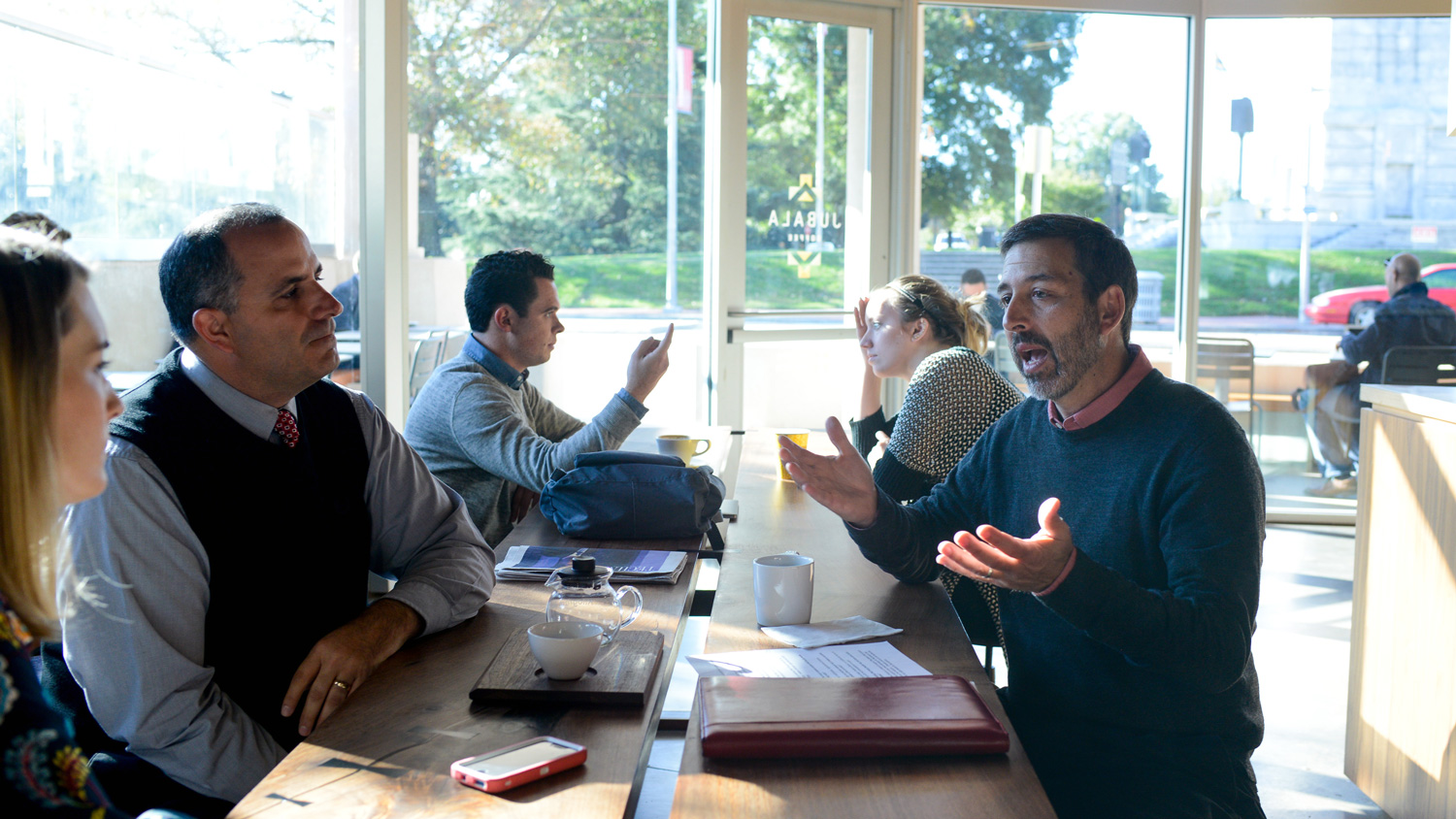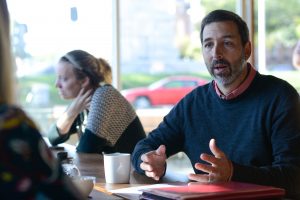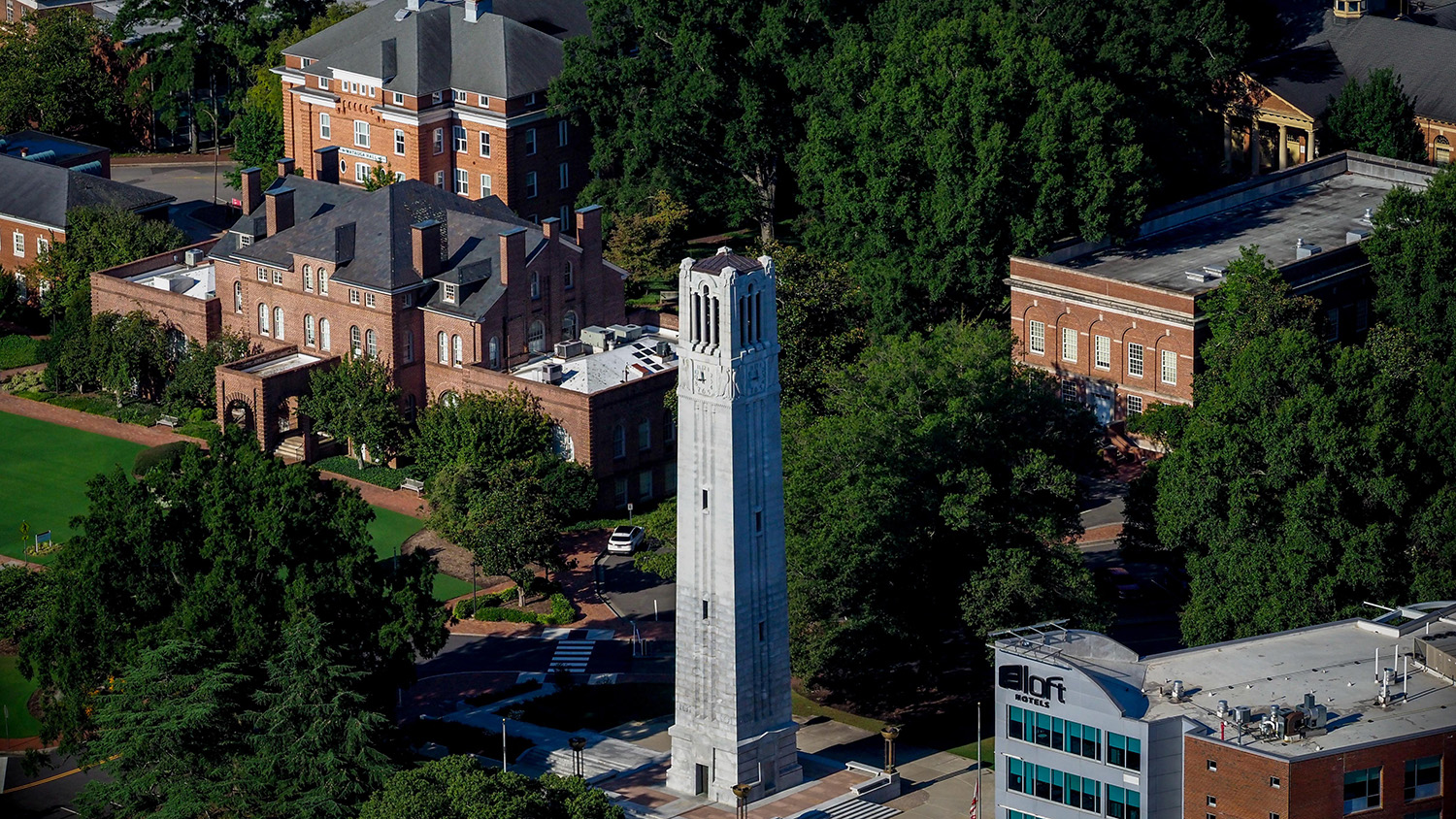Staff Chat: Roy Baroff and Mike Giancola

NC State strives to foster a culture of organizational excellence for faculty, staff and students. Roy Baroff and Mike Giancola help the university achieve this goal by serving in separate, yet similar roles.
Baroff, the faculty ombuds, has more than 25 years experience in the dispute resolution field as a mediator and attorney. Giancola, assistant vice provost and student ombuds, has served the campus community in various positions since 1998.
We spoke with Baroff and Giancola on the importance of ombuds services to NC State, and how both provide important resources to the university.
What is an ombuds, and how do the faculty and student ombuds serve the university community?

RB: When faculty or students have some sort of issue, they usually talk it over with someone. Often this is a friend, colleague, or family member. Someone they trust. The ombuds can be the “second” person to contribute to that discussion – the old adage “two heads are better than one.” To do this work ombuds embody four core values set forth by the International Ombudsman Association. We are confidential, an informal resource, independent, and neutral/impartial. We provide a safe place for people to bring concerns. The ombuds role supports individuals without taking a side, and we help bring to the surface issues common to many organizations.
MG: We are a resource for students. Many times students want to have a confidential conversation about a conflict they are having or want to discuss a decision they have to make, and need to gain another perspective on the issue. As the student ombuds, I follow the same four core values as the faculty ombuds. I do a lot of coaching with students to prepare them for difficult conversations, and to think about the relationships that are in play between students, faculty and staff. I help them prepare and have confidence in how to present themselves in what they perceive will be a difficult conversation. Additionally, students often need clarity on procedures or policies, available resources, and how to navigate the institution.
RB: People come to the ombuds office and usually gain a better understanding of an issue, and often generate options for action. I do a lot of strategic thinking with people around an issue. I want to be supportive by helping people talk through issues.
Why are the services provided by an ombuds essential to NC State’s pursuit of organizational excellence?
MG: The ombuds offices are part of a broader institutional commitment to excellence in all forms. When you think about NC State’s 34,000 students and thousands more faculty and staff, there will be opportunities for people to work through conflict. We provide a resource for people to work through their conflicts in a productive manner so that everyone can return to their teaching, research and learning that helps the university thrive. We have to acknowledge, however, that conflict does exist and people need resources to work through that. Of course, it is not all about conflict, but about making good decisions as well. That’s another key aspect of what ombuds provide for a campus.
RB: At institutions, there are going to be issues that arise. The ombuds role complements existing institutional services; however, being independent, confidential, neutral and impartial make the office different from any other organization or service on campus. That unique positioning gives people another resource, another communication channel, that helps them navigate issues and concerns within the university community.
What are some of the most common student and faculty issues that ombuds can help with?
RB: When someone has a conflict or any other issue, the earlier you can reach out to someone, the better – you’ll have more flexibility and more options that way. I encourage faculty to come and talk to me whenever they have an issue or concern on their mind. I’ve had a range of issues and questions come to me from faculty members including career progression, post-tenure review, mental health concerns, policy and rule issues, and colleague interactions to name a few. I’ve also helped faculty connect with existing services that they were not yet ready to utilize.
MG: I encourage students that if they are in doubt, make an appointment. Because this is an informal resource, there’s no harm in doing so and exploring various options in addressing an issue. Students are then empowered to make a good decision by knowing what their options are. I meet with students on a range of issues including academic, personal, career and organizational. Really any issue that students will benefit from an impartial and confidential discussion. I work with students involved in conflict resolution, where power dynamics are in play. For example, a graduate student may come in for advice on how to approach their advisor. A fair number of students I meet with are having problems navigating the university so we discuss their concerns and available resources they can utilize to help them be successful.
RB: How we do our work really matters in the sense that our efforts are focused on empowering people to solve issues, and to help them build their own capacities to handle issues in the future. This connects to the idea of organizational excellence – when people spend time with me, I want them to feel better about themselves, perform better work, and be more prepared for handling difficult conversations now and in the future.
How do the faculty and student ombuds help create an equitable and inclusive climate at the university?

MG: An ombuds definitely helps promote equity and inclusivity on campus. For example, I work with professors to think through how they set up their learning environments in and out of the classroom and how that impacts students. Faculty and staff may reach out to me about a student life issue that they want to talk through and see if their instincts are right. Through those conversations, they may become aware of university resources that help them make sure they are providing an inclusive learning environment for students. We provide a space to talk through issues and make appropriate referrals to other offices. When we have early and proactive discussions, we can do more with a situation.
We are also available to assist with skill development with campus constituents. We have a commitment to observe trends and issues that come up on campus and then offer training to help improve the campus climate.
RB: Creating equitable and inclusive spaces means creating an environment where people feel like their voices are being heard. There are many resources available on campus as NC State seeks to support diversity and inclusivity across campus and the faculty ombuds office can also help. It is a safe place for people to bring such concerns with the knowledge that the conversations are confidential and off-the-record (with limited exceptions including risk of harm to oneself or others and by law where information of abuse or neglect is presented). When someone comes to me, they retain control of their information, absent the exceptions, which is very important, particularly for people who may bring equity and diversity concerns.
Sometimes someone comes to me and we talk about an issue, and I may refer them to OIED, or HR, and their conversation with me is a dress rehearsal for other conversations. Once we’ve talked they feel more comfortable sharing the concern. And, if I hear enough information about a particular concern, I can reach out to university leaders and make recommendations on how to address those issues. At the same time, we protect the confidentiality of the information source. This is a way to surface larger issues that are often difficult to address.
What is something that many people may not know about what an ombuds does?
RB: One thing that I want people to understand is that we provide support, but not advocacy for one person or side over another. We want to do our best to remain impartial and follow best practices for working through issues. In addition, the Faculty Ombuds Office has been set up so that I am not a university employee. I do this as a part-time contract. I have a nearly 30-year legal career, and I am a professional mediator and arbitrator. I have also taught at area colleges and universities. Due to the nature of my position and experience, I can provide an additional perspective on handling issues.
MG: When students come to see me, I want them to know that they have an opportunity to explore all sides of an issue in a safe, non-judgemental environment. I am not an advocate for any specific student, but I am an advocate for fair process. My role is to listen for examples of where an unfair process is in play, or where the university may not be following a stated regulation or policy. More broadly, I look at where there are systemic barriers to student success. Our job is not to necessarily solve issues, but to help alert campus leaders to a situation so they can address the issue. We align with the university’s goal of promoting student success and help to remove barriers to that success.
Another aspect of my role that people may not know about is that I consult with faculty and staff in addition to students. To be clear, if faculty need advice on student-related issues, they can come to me in confidence. I consult with faculty and staff around student issues in and out of the classroom.
These are relatively new services, as student and faculty ombuds positions have existed less than three years on campus. For Student Ombuds Services, we saw a 21 percent increase in visitors to the office in year two over our first year in operation. As more people find out about these resources, they learn that we provide an informal and impartial place to talk through any issue. There are no bounds to what we can talk about because we’re just having an informal conversation.
RB: Supporting faculty success and surfacing broader issues to the university are very important to the faculty ombuds role. One thing that Mike and I bring to these roles is that we are not part of a single department and; instead, we are a part of every department on campus. Thus, I look for opportunities to connect people across the university to solve problems or issues that are presented. One of my goals is for the office to have a larger impact on the institution as a whole.
Learn more about the services provided by both the Faculty Ombuds Office and Student Ombuds Services.
- Categories:



Great News! Update on Staff Senate’s April 2016 resolution on “The Establishment of the Staff Ombuds Office”: under the AVC Williams’ guidance, University leadership has agreed to launch a year long pilot Staff Ombudsman Program which will commence on January 1, 2017. This pilot program is being funded by HR budgetary resources, and Staff Senate leadership will work with AVC Williams and Roy Baroff, who currently serves as the Faculty Ombudsman, to develop the pilot program implementation plan for this part-time Staff Ombudsman position. We are very grateful to the University for their consideration and support of this important Staff Senate request.
Angkana Bode
Staff Senate Chair
Who should we contact about Staff member concerns?
Thank you for your interest in a staff ombuds. We will launch a year-long pilot Staff Ombuds Program effective January1, 2017. More information on the program will be coming soon.
The Staff Ombuds will be a neutral, confidential, informal, and independent resource for all NC State staff members. The position will help staff consider options to approach difficult discussions and effectively resolve workplace conflicts. The Staff Ombuds will also help connect staff with existing services. Currently, various other resources are available to staff, including your HR rep, Employee Relations and the Office for Institutional Equity and Diversity. Additionally, the NC State Faculty and Staff Assistance Program provides support, resources and information for personal and work-life issues.
Roy Baroff MA, JD
NC State Faculty Ombuds
112 Cox Ave., Ste. 213
Raleigh, NC 27605
T 919-935-0922 Faculty Ombuds Office (off-campus number)
T 919-542-2575 Roy Baroff, Office (off-campus number)
Office hours by appointment only.
facultyombuds.ncsu.edu
The NC State Faculty Ombuds Office is a confidential, informal, impartial and independent office established to provide issue and conflict resolution services. The Faculty Ombuds is not an employee nor agent of NC State and both the Faculty Ombuds Office and Faculty Ombuds are not authorized to receive notice for NC State.
Do not use email for confidential communications. All electronic mail messages in connection with NC State business that are sent to or received by this account are subject to the NC Public Records Law. They are retained and may be disclosed to third parties.